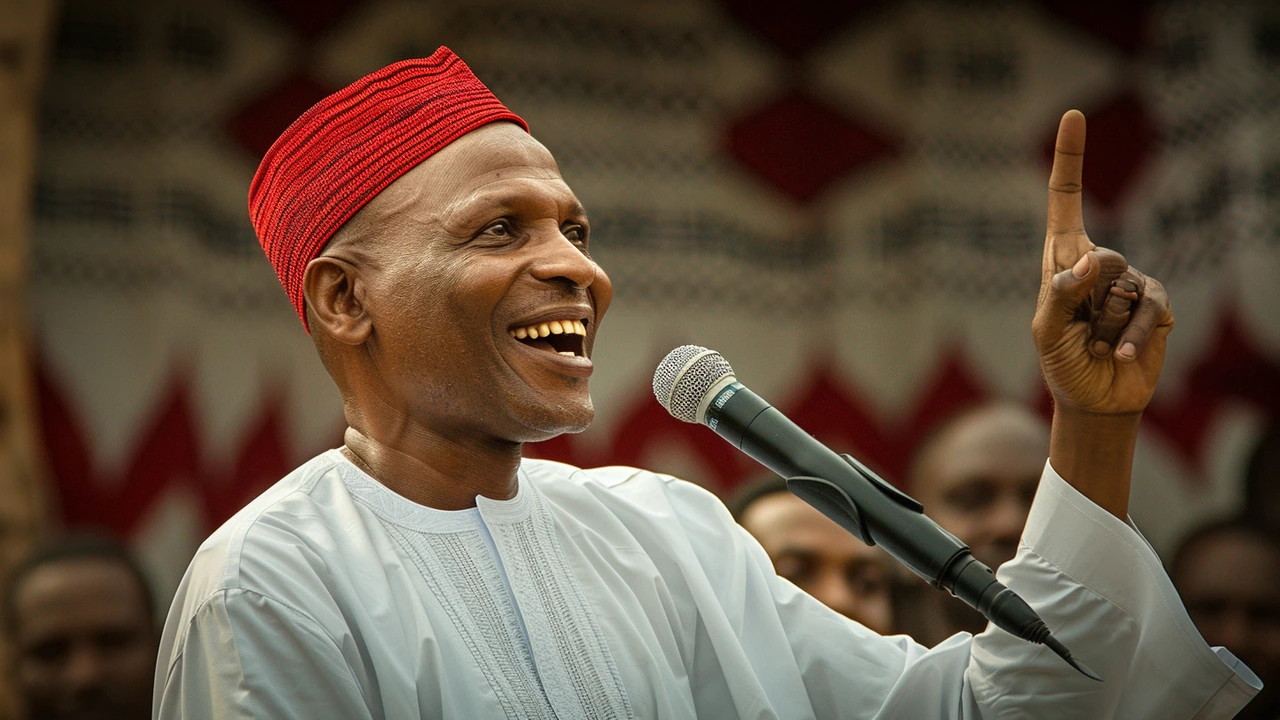Kano Kingmakers Assemble to Choose New Emir After State Reverts to Single Emirate System

Kano Kingmakers Assemble to Choose New Emir After State Reverts to Single Emirate System
The historic city of Kano has undergone a significant political shift with the recent repeal of the State Emirates Council Law of 2019. This dramatic change has resulted in the kingmakers of the Kano Emirate convening at the Government House to select a new emir. The repeal marks a decisive return to the traditional single emirate system, dissolving the additional emirates that were established during the administration of former governor Abdullahi Ganduje.
This legislative reversal by the State House of Assembly has set off a chain of events that will lead to the appointment of a new emir, a position of immense cultural and political significance in Northern Nigeria. The key figures instrumental in this significant decision include Lawal Husseini, the majority leader of the state House of Assembly, who was pivotal in moving the bill that led to the dissolution of the new emirates. As the dust settles, much anticipation surrounds the potential selection process steered by the current governor, whose assent to the bill is awaited with bated breath.
The repeal of the State Emirates Council Law of 2019 essentially nullifies the establishment of the additional emirates, which were considered controversial by many, and reinstates the singular emirate structure that has long been the hallmark of Kano's traditional governance. This move not only signifies a political statement but also reflects a returning to the roots and heritage that define the Kano Emirate's longstanding history.
Awaiting the Governor's Decision
The current political atmosphere is charged, as the state of Kano holds its breath in anticipation of the governor's decision. According to Lawal Husseini, there is currently no emir in Kano, and the process of selecting a new one is underway. The weight of this decision cannot be overstated, given the central role the emir plays in the socio-political landscape of Kano.
An intriguing layer to this unfolding story is the speculation surrounding the possible reinstatement of former Emir Lamido Sanusi, who was deposed in 2019. Though officially unconfirmed, the rumors of his return have ignited a wave of curiosity and debate among the people of Kano. Sanusi’s potential reinstatement would be seen by many as a poetic twist in the saga of the emirates, adding to the historic weight of the current deliberations.
The Legacy of the 2019 Council Law
The establishment of multiple emirates in 2019 was met with mixed reactions. Proponents of the change argued that it would help to distribute power more evenly and bring governance closer to the people in different regions. However, critics contended that it diluted the traditional power structure and was a move motivated by political maneuvering rather than genuine administrative need.
With the repeal of the law, Kano is poised to return to its original emirate system, a structure revered for its deep-rooted significance. This transition is seen by many as a restoration of tradition and continuity, which are pivotal elements in the cultural fabric of Northern Nigeria. The implications of this shift are profound, keeping both the local and national political landscapes attentive to the developments in the state's capital.
Implications and Future Outlook
The reinstatement of the single emirate system holds numerous potential implications. For one, it consolidates the traditional authority vested in a single emir, which could lead to a more unified and cohesive governance model. This consolidation might also enhance the social cohesion among the people of Kano, who have long associated their identity with the singular emirate system.
Moreover, the governor's decision on the new emir will undoubtedly be a strategic one, with political, cultural, and social considerations at play. The person who is selected will have the daunting task of not only continuing the legacy of the past emirs but also navigating the complexities of modern governance. The challenges will include addressing the expectations of the populace, maintaining the cultural heritage, and fostering development in a rapidly changing socio-political environment.
In conclusion, as the kingmakers deliberate and the governor prepares to make a crucial decision, the eyes of Kano, and indeed the rest of Nigeria, are set on the unfolding events. The selection of the new emir will signal not only a return to tradition but also a crucial moment of transition in Kano's illustrious history. The reverberations of this decision will likely shape the socio-political narrative of the region for years to come.






SAI JENA
May 23, 2024 AT 20:18The reinstatement of a single emirate in Kano marks a pivotal moment for the region's heritage, and it offers an opportunity for collective reflection on the values that have long guided the community. It is essential that we approach this transition with both respect for tradition and an eye toward inclusive progress. By uniting under a single leadership, the people of Kano can strengthen social cohesion and reinforce cultural identity. I encourage all stakeholders to engage constructively, ensuring that the selection process is transparent and representative of diverse voices. This collaborative spirit will help preserve the dignity of the emirate while fostering a forward‑looking outlook for future generations.
Donny Evason
May 24, 2024 AT 13:26From a cultural standpoint, the abolition of the auxiliary emirates restores the historic centrality of Kano's traditional authority, a move that unequivocally aligns with the region's authentic identity. The political calculus behind the 2019 law seemed aimed at fragmenting power, and its reversal signals a decisive realignment. It is imperative that the governor act swiftly, as prolonged uncertainty only fuels speculation and undermines confidence. The kingmakers now bear the weight of history, and their decision will echo through both local governance and broader national discourse. In short, the path forward must be assertive, decisive, and rooted in the cultural legacy that defines Kano.
Hariom Kumar
May 25, 2024 AT 03:20What an exciting time for Kano! 🎉 The return to a single emirate feels like a homecoming for many, and I’m thrilled to see the community rally around this change. Let’s keep the optimism high and support the kingmakers as they navigate this important decision. 🙌 May the new emir bring both wisdom and progress, honoring tradition while embracing the future! 😊
Phillip Cullinane
May 25, 2024 AT 17:13Analyzing the recent legislative reversal through a multidimensional framework reveals a confluence of sociopolitical vectors that converge upon the reinstatement of a monolithic emirate structure, thereby reestablishing a hegemonic paradigm that had been diluted by the 2019 proliferation of subordinate emirates. The procedural dynamism exhibited by the state House of Assembly operates as a catalyst for systemic realignment, wherein the dissolution of ancillary jurisdictions facilitates a recalibration of jurisdictional authority and administrative efficacy. From an institutional theory perspective, this recalibration represents a paradigm shift that reaffirms path dependency principles, underscoring the resilience of entrenched traditional governance models in the face of recent decentralization attempts. Moreover, the epistemic legitimacy conferred upon the kingmakers by virtue of their historical mandate amplifies the symbolic capital intrinsic to the emirate's cultural hegemony, thereby reinforcing stakeholder alignment across multiple strata of civil society. In operational terms, the governor's pending assent functions as a pivotal node in this decision matrix, with its timing and procedural transparency bearing significant implications for governance risk assessments. The prospective selection of a new emir will inevitably invoke considerations pertaining to succession planning, governance continuity, and socio‑economic development trajectories, each of which warrants rigorous stakeholder analysis. Accordingly, policy architects must engage in scenario planning that integrates both macro‑level geopolitical variables and micro‑level community sentiment indices to ensure optimal outcomes. The intersection of these variables, while complex, offers a fertile ground for strategic innovation within the traditional governance schema, potentially ushering in a new era of synergistic governance that harmonizes heritage preservation with contemporary administrative imperatives.
Janie Siernos
May 26, 2024 AT 07:06Such political maneuvers betray the authentic cultural fabric of Kano.
joy mukherjee
May 26, 2024 AT 21:00I hear the concern about cultural integrity, and I think it’s vital we keep the conversation constructive 😊. While preserving heritage is non‑negotiable, we also need to ensure that the process remains inclusive and transparent. A balanced approach can honor tradition without alienating progressive voices. Let’s stay focused on the shared goal of a stable and respected emirate.
Rob Chapman
May 27, 2024 AT 10:53Totally agree with the need for balance – keep the traditions alive and still let fresh ideas flow in. It’s all about finding that sweet spot where old meets new.